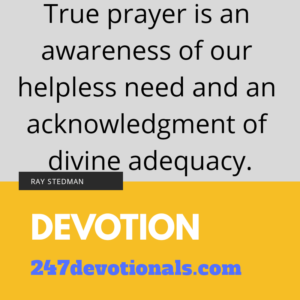Table of Contents
Topic:Who Am I, Lord?
For by the grace given to me I say to every one of you: Do not think of yourself more highly than you ought, but rather think of yourself with sober judgment, in accordance with the faith God has distributed to each of you.
Romans 12:3

Paul says to think about yourself. Many people get the idea that the Christian life consists of never thinking about yourself. Because we know that ultimately we are to reach out to others, we think that there is never any place for thinking about ourselves. That is wrong. It is true that some Christians have abused this to such a degree that all they think about is themselves. I know Christians like this who are forever going around taking their spiritual temperature, feeling their spiritual pulse, and worrying about their spiritual condition. It is wrong to think continually of nothing but yourself, but it is quite right to take time, occasionally, to evaluate yourself and where you are in your Christian life. In fact, Paul exhorts us with his apostolic authority to do so. “For by the grace given to me,” i.e., the gift of apostleship, based on that office he exhorts every one of us to take time to think through who we are.
Paul stresses that you have to do this in a way that avoids overrating yourself. “Do not think of yourself more highly than you ought.” He puts this first because this is such a natural tendency with us. But feelings can change and fluctuate a thousand times a minute. They are dependent upon so many factors over which we have no control. The most foolish thing in the world is to judge yourself on the basis of how you feel at any given moment. Feelings aren’t wrong; they are just not what you base your evaluation of yourself on. On what basis should you evaluate yourself? The answer, of course, is on how God sees you. That is reality — what God says you are. It is a two-fold evaluation, as the apostle makes clear in this verse.
First, he says, “Do not think of yourself more highly than you ought, but think of yourself with sober judgment.” Think soberly about yourself. What does that mean? Surely that refers to the teaching of the Scriptures that we are all fallen creatures. We all have within us the “flesh,” which is not to be trusted at all. As long as we are in the flesh, in the body, we are going to have fleshly struggles. There will be something in you that you can’t quite trust. There will be thoughts and attitudes and temptations in your life which are distorted and wrong. And they will always be there.
But then, second, think with “the measure of faith that God has distributed to each of you.” Look back over all God has told you about what has happened since you have come to Christ. The degree to which you trust what God has said about you will give you confidence and courage and ability — through Christ’s life within you — to function any day, or at any given task. What has God said about you? Look back over all the tremendous truth given in the first eight chapters of Romans: We are no longer in Adam, in our nature or spirit, but are now united with Christ. He lives within us, his power is available to us. The Holy Spirit has come to enable us to say, “No” to all the evil forces and temptations that we come up against, so that sin shall not have dominion over us, for we are not under the Law but under grace. That is the way to think about yourself. You are always going to have to be on guard because of the evil of the flesh within you, but you can always win because of the grace of God and the righteousness of Jesus Christ and the gift of the Holy Spirit which you have.
Father, help me to discover who I am before you, and then to fulfill that, that I may bless your own heart, and fulfill my own life.
Life Application
Who or what is defining our personal identity? Pop psychology? The news media? Our relationships? Are we experiencing the transforming freedom of His rightful ownership?
